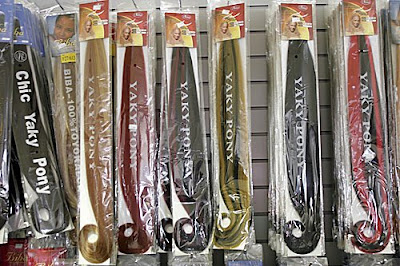 While perusing an old issue (May 2008) of Ebony Magazine, I came across an interesting article. The article entitled, “Koreans Capitalize On Black Beauty’s Big Business” By: Adrienne P. Samuels discusses the billion dollar hair care business that is bolstered by Black dollars.
While perusing an old issue (May 2008) of Ebony Magazine, I came across an interesting article. The article entitled, “Koreans Capitalize On Black Beauty’s Big Business” By: Adrienne P. Samuels discusses the billion dollar hair care business that is bolstered by Black dollars.
According to the article, Black people spend “between an estimated $1.8 billion to $15 billion a year” on hair care (according to 2008 figures).Here are some thought provoking quotes from the article:
1) “As Blacks found more interesting ways to switch up their hairstyles, the beauty supply stores were more than happy to stock the products needed. Of course most of them brought their products from Korean distributors, thereby keeping all the money in the nationality.
One of those distributors is 7-Dollar Beauty Supply of Dallas. For them, says owner Jun Lee, the Jheri curl was the introduction of the glory years and a portent of great things to come.
‘Business was really good back in the 80s and early 90s and that’s when you needed the curls,’ says Lee, who sells so much product that one of the world’s largest perm manufacturers gave him gift tickets to the 2008 Super Bowl. ‘People used a lot of activator and men were involved so we had a lot of product we were selling. And the most beautiful thing is they were washing it down the drain.'”
2) “According to market research company Mintel, Blacks make up ‘only 13 percent of the American population, but account for 30 percent of hair care spending.’
Our hunger for hair wares started in the 1880s. Madam C.J. Walker (a Black woman) became the nation’s first self-made female millionaire via popularizing the use of the hot comb to straighten Black hair. Fast forward 100 years, to the 1980s, when many Black-owned, Chicago-based companies became the primary manufacturers of Black hair care products, including relaxers. Many of those old-school companies sold themselves to White companies. Today, only a handful of Black-owned manufacturers and distributors exist, such as the Atlanta-based Bronner Brothers and North Carolina-based Dudley Products Company.
Black manufacturers have been largely replaced with White-owned groups such as SoftSheen-Carson, L’Oreal and Proctor & Gamble- all companies that tend to advertise heavily to Black audiences.”
3) “Hamilton, who also owns a beauty supply store in Waukegan, IL, says that Koreans don’t necessarily keep Blacks out the game. It’s more of a supply and demand issue, she says. The distributor makes a contract with every store and the distributor agrees to not sell the same products to any store that opens within say, 5 miles of the first store. This way, everybody make more money with less competition.
Of course, if competition does find a way to enter they block, someone- usually the Korean- will lower his or her prices.
‘If somebody comes next door to me and oepns a beauty supply, they’re not going to get my brands,’ says Hamilton. ‘It doesn’t matter if they’re Korean or not. A lot of times we sign contracts saying for so many square miles you can’t sell.’
However, documentary filmaker Aron Ranen isn’t buying it.
Ranen’s 2006 DVD, entitled ‘Black Hair: The Korean Takeover Of The Black Hair Care Industry,’ bills itself as an expose on how Koreans took over the ethnic beauty supply arena and conspire to keep all others out of the business.
In the film, which has been viewed over 250,000 times on YouTube, Ranen suggests that Korean distributors only sell products to Korean stores, thereby canceling out the opportunity for new, and Black entrepreneurs to sell products. Ranen also suggests that Korean storeowners are not likely to sell products produced by Black companies.
‘I don’t think people understand the magnitude of this issue,’ says Ranen, 46, who is White and originally from the New York area. He decided to make the documentary after hearing a few comments from friends. ‘This is a global thing. It’s not about the local store. It’s about stores around the world.’
Language is also a factor, Ranen says, since the largest Black hair care trade magazines are printed in Korean. Also, a quick visit to many web sites for distributors will show the pages printed in Korean with an option to view in English.
While creating the documentary, which was filmed in part in Chicago and California, Ranen came across several Black stylists and other entrepreneurs who felt the situation was unfair. They created the Black Owned Beauty Supply Association, or BOBSA.”
4) Everyone- no matter their race- at this point has learned to work together, says Clyde Hammond, president of Summit Laboratories and chairman of AHBAI [American Health and Beauty Aids Institute]. Hammond, who is Black, runs a Chicago-based company that produces hair care products. He understands how much of the business got away from Blacks. However, he said, it would be nice to see more Black owners and distributors.
‘I wish we could find some African Americans who would step up and say, I want to be an entrepreneur,’ says Hammond. ‘We would work to support them and back them.'”
The above quotes gives the reader a lot to think about, including: The reasons for the dearth of Black distributors in an industry that is mostly funded by Black consumers, how Black consumers decide where and how to spend their dollars, and how our images of ourselves and what we consider beautiful play into our spending habits- to name a few.
 Dr. Meredith Gourdine was a pioneering researcher in electrogasdynamics (a way to disperse fog and smoke). He held more than 40 patents.
Dr. Meredith Gourdine was a pioneering researcher in electrogasdynamics (a way to disperse fog and smoke). He held more than 40 patents. 




